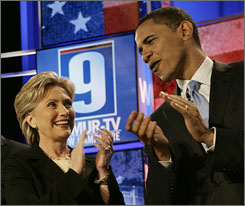American Idol: Hillary vs. Barack

How is the election like television’s most popular program? My friend David Ginn shares his thoughts for lemonwade:
For the Democrats, Election 2008 has been the most riveting reality show since season 2 of “American Idol,” Clay vs. Reuben. With the media constantly making Hillary vs. Barack a race vs. gender issue for the party’s nominee for President, the results will supposedly tell us if this country is more racist or more sexist. On the Republican side, it inevitably becomes a youth vs. maturity issue. Is 71 the new 60? We’ll see. In the case of “American Idol,” voters make their decisions based on several factors: song choice, music genre, sex appeal, and simply wanting someone to win over the other. Voters in the upcoming Presidential election are more interested in the candidate’s stance on the issues, their likability, and their experience.
In the 2004 Presidential election, which took place during “Idol”‘s Clay vs. Reuben year, there were 120 million voters, which equals 60% of the eligible voter population. Meanwhile, 1 in 10 Americans voted in the contest between Aiken and Studdard. Sure, the only qualification for voting in “American Idol” is access to a telephone. But many the voters of that contest are now old enough to vote for the next President, and 35% of them, according to Fox News, believe their “American Idol” vote is as important as a vote for President. For the next debate, I think the candidates should perform their respective theme songs: Clinton singing Celine Dion‘s “You and I” and Obama belting out Marvin Gaye‘s classic “Let’s Get it On.” Paula would swoon.
As a first-time voter, how does one arrive at one’s own political position? Unfortunately, all you need these days is a television and a computer and your favorite channel or website. Every news network has a panel of experts constantly deciphering information. The really clever ones have panels that include a black, a woman, and a white man. Remind you of anything? None of the Presidential “experts” appear drunk or overuse the term “dog,” but the visual is still the same.
With all of the new cable channels, everyone is looking for ways to fill up their airtime without realizing how dangerous that can be. If they keep asking the race or gender question, the election will become an issue of race and gender. With such an emphasis, the media are leaving very little room for the person who votes on the issues and on the integrity of the candidates. They are insulting us, particularly anyone under 30, by suggesting that anyone, of any age, is incapable of making an informed decision based on the quality of the candidate. This was abundantly clear in South Carolina when CNN ran a story suggesting that black women are in a unique position with having to choose to vote their gender or their race. By reducing the candidates to a label, they are forcing potential voters into a box and therefore these citizens may be driven to vote contrary to said box. Instead of being responsible for your own individual voice, it’s assumed that you will vote to support your perceived demographic.
There are several positive aspects of “American Idol“Â that can enhance our political voting process. If voting were as easy as logging on or texting, then more people would vote. Secondly, if we were allowed to vote more than once, then we could show our support for more than one candidate. For instance, if we were on a 10-points system, then we could assign the number of points to each candidate the way we see fit. This way we could truly measure the depth or Americans’ feelings towards the candidates. Thirdly, instead of random newscasters running the debates, why not employ a gallery of ex-Presidents?
Finally, voting online or through the telephone might eliminate opportunities for inaccurate entry and exit polls. Voting would truly be anonymous, and these media “reporters” would be forced to focus on the issues. Votes would be just numbers showing support for the candidates without a face or profile. No reporter could speak on a “black” vote or a “female” vote simply because they have footage of someone from that category going into the booth. Candidates would no longer be as able to tailor their words to a particular group based on a perceived voter trend. If you don’t know what I look like or what my interests are, how would you talk to me?
